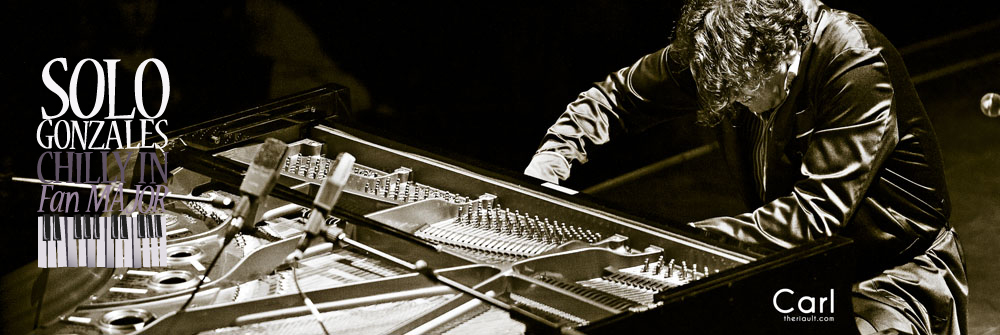Tomorrow is the day we have all been waiting for: Solo Piano III will finally be here. Fortunately, we were at the premiere in Geneva. Unfortunately, Gonzo didn’t play the full album – however: Fortunately, the few pieces made my soul rejoice. Unfortunately, the Ostinato made me aware I’ll never ever reach heavenly Aretha’s voice. Fortunately, Gonzo gone Beast for a minute, played the drums like the most freakin’ Muppet. Unfortunately, my amateur rhymes are just a rapper’s spit turned into foam. Fortunately, this idea here killed the white paper syndrome. Unfortunately, “Fortunately, Unfortunately” was the first and only “Soft Power” song he played live in ages. Fortunately, it’s a (re-)start – those pieces belong to the stages.
I know this sounds much better in its original form, but it expresses what the whole concert made obvious: Gonzo embraces his whole oeuvre like never before. The upcoming album is not only a sign of the times, but a statement from a musical humanist.
Songs from all decades (how that sounds…) and almost all albums made it to the Centre des Arts in Geneva. In obvious and subtle variations, as snippets, long versions or a hint between songs. The show started with some long awaited Solo Piano III pieces – one of it with an obvious Daft Punk flavor – and for the first time ever, I attended a Gonzo-concert without any “reference” – except for the few hints he spread over weeks: I didn’t know the songs, I didn’t know their titles, I didn’t know their “stories”, I could simply “be” and innocently give myself to the pieces to get touched to the core and linger in awe. It also gave me time to think. And so this is not a common concert review, but rather a personal train of thought I want to share about Solo Piano (I-III).
Trinity, Pythagoras and three hands
Three – that’s the number of perfection. Think of Pythagoras or triads. Multiple centuries ago they invented “The Trinity”, the religious equivalent to the mathematical triangle theorem, a reference system between Father, Son and Holy Ghost (after 36 years on earth I still haven’t figured out what the latter is). I don’t believe in God. In my opinion, God is a spelling mistake: God is good. The good within ourselves. I believe in Good. And I believe that the divine becomes visible in the beauty surrounding us, in the Wonderful World in a Louis Armstrong sense, it becomes “readable” in the pantheistic writings of Goethe and sometimes it finds access to our hearts through our ears. Take Beethoven’s 9th or the 3rd. Or Solo Piano III. “Musical purity”, as the intro says, “not an antidote of our times, it’s a reflection of all the beauty and ugliness surrounding us.” It needs the ugly to perceive beauty. It needs the (D)Evil to counterbalance G(o)od. It needs a third sentence to make this feel whole.
Three hands on the cover suggest Gonzo eternalised one of his characteristic features, especially when he plays live: He makes one piano sound like two – or following the cover, like playing with three hands (in my mind it sounds like 4). The piano-triopus. His impetus is different from any other player. It’s the way he animates his pieces using his full body and will power, the way the person amalgamates with the piano.
And as he moves on to the baroque-ish, harpsichord-like version of Dot, I can’t help but being beamed back and getting emotional. For me, each Solo Piano album marks a period in my life. Each piece became a companion of a certain time, a certain experience, a certain state of mind. Solo Piano I marks my pre-married life. Solo Piano II was the soundtrack to becoming a mother. It was also the soundtrack to becoming a single parent. Solo Piano III arrives at a time, I’m at peace like never before – and peace is the sentiment I felt, when the few pieces I’ve heard already resonated with me. It could be the prelude to a new era.
Maybe Solo Piano III follows the logic of a triad (or the logic of a life itself): Three notes being perceived as perfection – be it in major or minor. Each note can stand alone, but only together they reach completion. The ear longs for the third note. SPI: It’s the beginning. SPII: The tension cravingly climaxing towards resolution. SPIII: The third note – carried by the first two, it contains the essence that leads to perfection. Perfection in fact doesn’t exist. It’s always either a construct, a (social) convention, a perception or an illusion. Or as Gonzo puts it in the verbal prelude: “It’s a mostly happy ending in C major, but there is more dissonance, tension and ambiguity along the way.”
He calls it a “trilogy” and a “final act.” As we all know though: there are tetrads and five-note chords too. Three might be as close to perfection as it gets – but the human spirit is insatiable.
